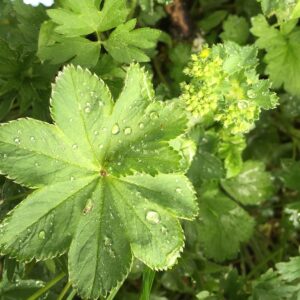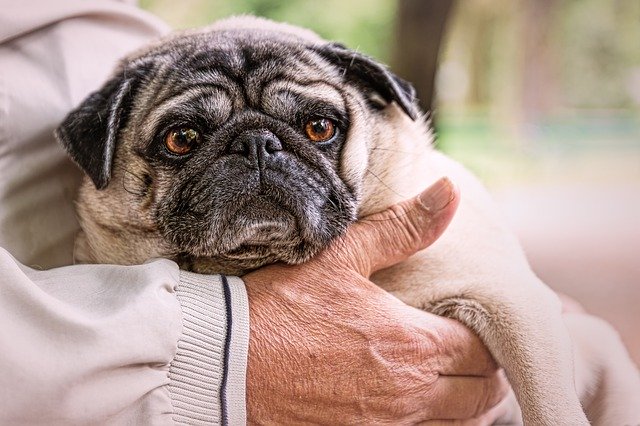Dear Annie, what can we do to prevent urinary infections in dogs? We have a 4-year-old French bulldog. He is suffering from paralysis and has a tendency toward UTI’s?
Thank you for your great question. First, let me state up front that I am not an expert in using herbal remedies with animals. I have always had dogs and do use herbs in their health and healing, but do not have special training to work with pets. That said, here are a few guidelines I’ve come to feel important when working with my own pet’s in relation to herbal medicine.
General guidelines for using herbs with dogs

- The gentler the better. Most experts suggest many of the same herbs for the same conditions as humans. They suggest dosages that compare to a human adult, with consideration to the size or weight of the animal. I find that my dogs’ digestive system is more sensitive. They do not seem to tolerate alcohol tinctures well (unless diluted). Smaller more frequent dosages are better, like working with small children. Gentle, nutrient herbs seem to be more beneficial in the long run.
- Dogs take their medicine easier in the form of a treat or in their food. I’ve tried a lot of different ways to get my dogs to take their herbs. My dogs stick their noses up when I put herbs in the water. I don’t like capsules (unless I load them) because the dose is usually too large. So, if you’re going to buy capsules its best to get the ones formulated for pets. The best method I’ve found is to put their herbs in their food. My favorite way to dose my dogs with herbal remedies is to make a bone broth infusion. (I’ll give a recipe later), or to add liquid extract to broth and then add it to their food.
- You never know how an animal (or human for that matter) will respond to herbal therapies. ALWAYS START WITH A LOW DOSE and work up from there. If your dog has a reaction stop. If things are going well, you can increase the dose to a therapeutic range. Trust your instincts and your powers of observation. If you think something is not right. Then IT’S NOT! Herbs taken as medicines should always be treated as medicines whether for human or animal.
Dosage Chart for Animals
The following dosage chart was published by Dr Doug Knueven, The holistic Vet. (check him out online). This chart may be a good place to start when figuring how much of what to give Fido. All are indicated 2-3 times per day. I recommend diluting tinctures is water, milk or broth. Whatever your pet likes.
Pet’s Weight Tea Dried Herb Tincture
0-10 lbs 1/8 c 1/8 tsp 1-3 drops
10-20 lbs ¼ c ¼-½ tsp 3-5 drops
20-50 lbs ¼-½ c ½-1 tsp 5-10 drops
50-100 lbs ½-1 c 1-2 tsp 10-20 drops
>100 lbs 1 c 2-3 tsp 20-30 drops
About Pet Paralysis

Paralysis in dogs can be caused my many factors. Some are permanent and some can be temporary. Many dogs lose control of their bladder and bowels when the lower part of their body is paralyzed. This can be experienced as either incontinence or retention. Talk to your Vet to see if and what special care is needed for your pet. Paralyzed dogs are at a higher risk of bladder infections (UTI). First be sure they are drinking enough water and that their urine is completely expelled. Ask your vet how you can help. Next be sure the area around the urethra is kept clean. When an infection is present there may be a change in urine color or odor. Although this isn’t always the case.
Herbal Solutions for Urinary Infections in Dogs
Herbs that may help prevent urinary infections in dogs, as a side benefit, may also help tone the colon wall. Below are some herbal categories and herbs to consider. This list is by no means definitive.
- Astringent herbs that tone urinary tissue – Our Ladies Mantle, Cranberry, Bilberry leaf and berry (they work best together), and Plantain.
- Mucosal Vulneraries – Plantain, Parsley, Yerba Mansa, Horsetail, Marshmallow root
- Urinary antiseptic or anti-microbials – inhibits microbial growth and expression – Cranberry, Blueberry, Bilberry, Yerba Mansa, Plantain, Parsley, Echinacea
- Herbs that decrease incontinence and urinary overflow – Our ladies Mantle, Burdock, Saint John’s Wort, Plantain.
- Alterative herbs that help reduce build up of toxins in bloodstream – Burdock, Cleavers, Dandelion, Echinacea.
The Herbs for Urinary Infections in Dogs
Following are a few herbs I like to tone and protect the urinary system while helping to prevent UTI in dogs.
Our Ladies Mantle (Alchemilla vulgaris)

Traditionally used to balance women’s reproductive issues, this herb may be a wonderful support for any being suffering from lower body paralysis. Our Ladies mantle heals, tones and protects hollow organs in the body, rebuilding affected tissue and strengthening the muscles. Hollow organs include the uterus, colon, intestine, bladder, the heart etc. It is further used to relieve cystitis, urinary incontinence, prevent or repair prolapse, to sooth and tone bowels and to check excess mucus production.
Burdock root (Arctium lappa)

Burdock root (Arctium lappa) – Helps moderate or harmonize actions of the urinary system and lymph. Its alterative action makes its use helpful to eliminate toxins from the body. Burdock is specifically indicated when working with urinary incontinence, bowel incontinence, frequent urination, and bladder irritation. It may also help prevent the build up of stones and other deposits.
Cranberry (Vaccinium macrocarpon)

A classic when it comes to urinary health. The berries tone urinary tissue while preventing bacteria from adhering to the urinary walls. It is therefore a wonderful tonic to prevent or treat urinary infections. If I only had one herb to choose in this instance cranberry is the one, I’d choose.
Saint John’s Wort (Hypericum perforatum)

Works to regulate urination with antibiotic and antiviral properties. However, the main reason I like this herb for in instance is Saint John’s Wort’s traditional use to rejuvenate nerve tissue. Perhaps helping to heal nerve damage associated with paralysis.
Recipes
Herbal UTI Bone Broth 1-quart bone broth (any kind you and your dog likes) 2 oz combined herbs as below 2 parts Cranberries 1 part Ladies Mantle 1 part Plantain 1 part Burdock Root 1 part St. John's Wort Place herbs and bone broth in a medium saucepan and bring to a boil over medium to low heat. Steep slowly for 5 to 10 minutes. Remove from heat, cover and let cool. Strain. Add water to bring total back up to 1 quart. Frigerate up to 1 week. (May be frozen as needed)
Use the dosage guild as above to add to your dog’s food 2x per day. (I might start with ½ of the amount given to make sure there are no adverse reactions). You can always dilute the broth with water or more broth as you like.
Herbal UTI Liquid Extract Combine individual herbal extracts. 2 parts Bilberry (Vaccinium myrtillus) extract (I like the berries and leaf mixed) 1 part Plantain extract 1 part Burdock Root extract 1 part St. John's Wort extract Use the dosage chart above to add to broth or your dogs food 2-3 times per day
FYI – Toxic Plants for Dogs. Below is a list of herbs and essential oils considered toxic for pets. It’s included here because I thought you would want to know. This same list appears on all the websites listed in the resource section below.
- Pennyroyal – Very toxic to dogs & cats
- Tea Tree Oil – Very toxic to cats & small dogs
- White Willow Bark – Contains salicylates which are toxic to cats
- Garlic – Can cause anemia at high doses
- Ma Huang – Toxic to cats
- Comfrey – Can cause liver damage
- Hops – Toxic to greyhounds
Product Suggestions for Urinary Infections in Dogs
Available at Wonderment Gardens
Individualized and standard herbal formulas are available online at Wonderment Gardens LLC. As a clinical herbalist, I am always happy to assess your personal needs and develop a specific formula.
Affiliate Product Suggestions for Urinary Infections in Dogs
Below are affiliate linked products. That means, if you purchase a product through one of the links, I make a commission at no additional cost to you. Rest assured I only suggest products I can support and feel confident about. Thank you for your support.
PetHonesty Cranbladder Health
Cranbladder health is a urinary tract support supplement for dogs. I love this formula. My dog is getting older and is having less mobility in her hips. As a result she lays around a whole lot more and has recently been having recurring urinary problems. I like to use herbs, and I like to make my own. But after about 2 months of off and on issues I decided to try this formula because I like everything in it. Man, withing a few days she is feeling better and acting 5 years younger. Good Stuff. Below is the link to purchase yours.
Most of the supplements out there for Canine UTI and incontinence have most of the same (or very similar) ingredients. Most look really good. So, it comes down to how you prefer to give herbs remedies to your pets. I have one dog that will eat anything that looks like a treat and another one who is very picky and I have to hide everything in broth or left overs.
Here’s a link to shop for quality organic bulk herbs.
Thank you for taking the time to read my blog. I have been really enjoying the whole process. It is my bliss to share my experience and research with you. I hope you find it helpful.
Please join the conversation by sharing your experiences and preferences. I would love to hear your thoughts and ideas, what has worked you your. What hasn’t.
Thank you
Blessings
Annie
References
The holistic vet https://drdougknueven.com/?p=339
https://www.caninejournal.com/how-to-treat-uti-in-dogs/
https://www.pawfriendly.com/petcare/paralyzed-dog.shtml#.XbYrEehKjIU
David Winston RH (AGH): 2009 Lecture notes; Little Known Uses for Common Medicinal Plants; Southwest Conference on Botanical Medicine
David Winston RH (AGH): 2015 Lecture notes; Herbal and nutritional treatment for common genito-urinary problems; Southwest Conference on Botanical Medicine
Disclaimer
These statements and products have not been evaluated by the FDA. They are not intended to diagnose, treat, cure, or prevent any disease or condition. If you have a health concern or condition, consult a physician. Always consult a medical doctor before modifying your diet, using any new product, drug, supplement, or doing any new exercises.
Herbs taken for health purposes should be treated with the same care as medicine. Herbal remedies are no substitute for a healthy diet and lifestyle. If you are serious about good health, you’ll want to combine diet, exercise, herbals, a good relationship with your doctor and a generally healthy lifestyle. No one of these will do it alone.
This information is designed to be used as part of a complete health plan. No products are intended to replace your doctor’s care, or to supersede any of his/her advice or prescriptions.


Thanks, Annie, for the link to the herbal chews for dog incontinence. My dog is also 12 and the best dog ever (a miniature Aussie). I was coping with the situation, but it was a workout. She and we are so much happier now that the nightly accidents are no longer.
I also enjoyed watching your yoga workout with your grandson, a future pro!
Take care,
Moonbarker in Houston
Hi Carter,
What a relief when our loved ones feel better. Glad the my suggestion helped. Blessings to all.